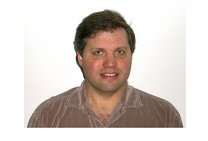Oral history interview with George A. O'Toole
- 2008-Jan-16 – 2008-Jan-17
George A. O’Toole grew up in rural eastern Long Island, New York, heavily influenced by his parents and their Irish and Italian immigrant families. Throughout his youth, his parents, both in education, stressed the importance of school and attending college. In high school he was especially encouraged by a science teacher who praised O’Toole’s interests in science oriented shows like Nova and Nature. O’Toole participated in a research program for high school students at Catholic University of America in Washington D.C., where he was first exposed to cell biology. Deciding he wanted to pursue biology, O’Toole matriculated at Cornell University where he earned a position in the Cornell Tradition scholarship program. Throughout his time at Cornell he balanced his studies with his work in the Noyes dining hall. Early on O’Toole engaged in extra laboratory research and had a paper accepted to the Cornell Undergraduate Journal of Science. He worked as a dishwasher in the microbiology research laboratory of Steven H. Zinder, though ultimately conducting research on methanogenic archaea. After graduating from Cornell, O’Toole began his graduate research as Jorge C. Escalante-Semerena’s first graduate student at the University of Wisconsin, focusing his research on the genetics and biosynthesis of Vitamin B12; during what little free time he had, O’Toole became active in political campaigns. In the small Vitamin B12 field, he published nine papers, learning the process of writing a scientific paper directly from Escalante-Semerena. Upon finishing his PhD, O’Toole undertook his post-doctoral research with Roberto Kolter at Harvard Medical School, where he began his work in biofilms. While in the Kolter laboratory, O’Toole took advantage of the inquisitive scientific atmosphere and intellectual freedom fostered in the group to make his mark in this field. Although he considered working in biotechnology companies, O’Toole accepted a position at Dartmouth Medical School and opted to work as a consultant for his friend’s company, Microbia. As soon as he started his lab, O’Toole immediately began efforts to create an environment that fostered success and creativity in his students. Shortly after arriving at Dartmouth, O’Toole received a Pew Scholar in the Biomedical Sciences award from which have come numerous collaborations and a networking system. Throughout the interview O’Toole discusses the current climate of funding, mentoring, scientific ethics, and the importance of translational research with regard to scientific responsibility.
Access this interview
By request 1 PDF Transcript File and 2 Audio Recording Files
Fill out a brief form to receive immediate access to these files.
If you have any questions about transcripts, recordings, or usage permissions, contact the Center for Oral History at oralhistory@sciencehistory.org.









